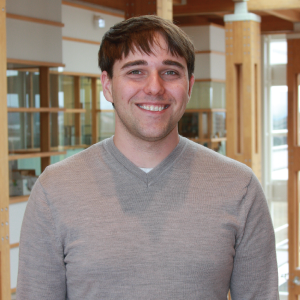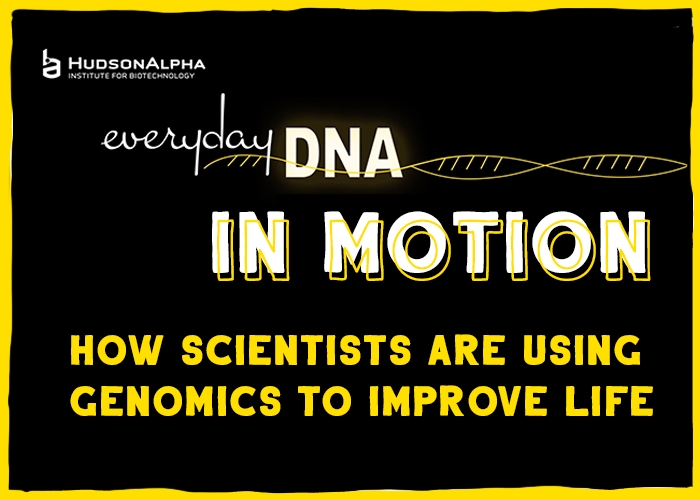Huntsville, Ala. – A grant from the BrightFocus Foundation will bring $200,000 to the HudsonAlpha Institute for Biotechnology with the goal of better understanding one of the key genes implicated in causing Alzheimer disease.
Nick Cochran, PhD, was awarded a Postdoctoral Fellowship Award from the Alzheimer’s Disease Research Program to study the MAPT gene with the ultimate hope of learning how the gene is turned on and off. MAPT is the instruction set for a protein called tau. The accumulation of tau in the brain is linked to Alzheimer disease. If scientists can figure out what turns MAPT on and off, the gene could be deactivated to reduce tau and potentially help people with neurodegenerative disorders.
“I watched the devastating effects of neurodegenerative disease ripple through both sides of my family, which drew me to work in this field,” said Cochran, a senior scientist in the Rick Myers Lab at HudsonAlpha. “Now I have the chance to expand science’s grasp on one of the most important genes involved in these diseases.”
“We could make a real difference here.”
Seeking Tau
The cells in the brain that control thinking are called neurons, and in patients with neurodegenerative disease, the function of neurons gets disrupted. Tau, a protein, helps provide the structure for healthy neurons, but in Alzheimer disease, tau breaks away from that structure and clumps together. This accumulation happens specifically in the regions of the brain involved in memory, though if a certain tipping point is reached in the disease, tau can spread rapidly through the rest of the brain.
“Reducing tau could provide relief for patients with Alzheimer disease,” said Cochran. “One way we might be able to reduce tau is to turn off the gene.”
In order to turn that gene off, however, you have to know where to find the switch.
Gene Expression
In order to understand adjustments to gene function, you first need to conceptualize how gene expression works. Instead of just an on-off switch, think of this more like a dimmer. The gene can be on or off, but it can also be bright or dim.
What Cochran hopes to asses is what parts of the DNA in neurons ‘brighten’ or ‘dim’ the tau producing gene called MAPT. In order to do this, Cochran will isolate pieces of DNA that are geographically close to the MAPT gene, then test each one of those pieces individually to find which ones have an effect on tau production.
“One way we can test which regions are associated with tau production,” Cochran explained, “is to take neurons, where tau is highly expressed, and compare them to precursor cells, where tau barely gets expressed at all. We should be able to learn a lot from the differences between those cells.”
Mission Funding
This funding from the BrightFocus Foundation allows Cochran to conduct the experiments necessary to isolate the genetic pieces that influence tau production. With a better understanding of what changes the expression levels of MAPT, researchers could take that knowledge and work toward a treatment that would reduce the amount of tau in the brain.
“Scientists have long thought that reducing tau could help patients with neurodegenerative diseases,” Cochran said. “We want to find new ways that may facilitate making that possible.”
The HudsonAlpha Institute for Biotechnology is a nonprofit research organization. The Institute relies on grants and the generosity of donors for our world-changing genomics research. If you want to contribute to the Institute’s research mission, you can donate online right now. Just follow this link.
Acknowledgement is made to the donors of Alzheimer’s Disease Research, a program of the BrightFocus Foundation, for support of this research. BrightFocus Foundation is a premier source of private research funding to defeat Alzheimer’s, macular degeneration, and glaucoma. The nonprofit organization is currently managing a global portfolio of nearly 200 research projects, a $40 million investment in the bold, innovative science that will find the cures for diseases of mind and sight.
About HudsonAlpha: HudsonAlpha Institute for Biotechnology is a nonprofit institute dedicated to developing and applying scientific advances to health, agriculture, learning, and commercialization. Opened in 2008, HudsonAlpha’s vision is to leverage the synergy between discovery, education, medicine, and economic development in genomic sciences to improve the human condition around the globe. The HudsonAlpha biotechnology campus consists of 152 acres nestled within Cummings Research Park, the nation’s second largest research park. The state-of-the-art facilities co-locate nonprofit scientific researchers with entrepreneurs and educators. HudsonAlpha has become a national and international leader in genetics and genomics research and biotech education and fosters more than 40 diverse biotech companies on campus. To learn more about HudsonAlpha, visit hudsonalpha.org.
Media Contact:
Margetta Thomas
mthomas@hudsonalpha.org
256-327-0425



